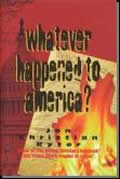Other
Brownfield
Articles:
Fear Not-The
Odds Are on
Your Side
Derry Brownfield
December 28, 2007
NewsWithViews.com
H.R. 2421, �Clean Water Restoration Act of 2007� is due to be marked up for a vote in the US House sometime this fall. According to the bill, water is a unique and precious resource that is necessary to sustain human life and the life of animals and plants. This bill will protect intrastate waters and �OTHER WATERS OF THE UNITED STATES.� �OTHER WATERS� are defined in the legislation as:
�All waters subject to the ebb and flow of the tide, the territorial seas, and all interstate and intrastate waters and their tributaries, including lakes, rivers, streams (including intermittent streams), mudflats, sandflats, wetlands, sloughs, prairie potholes, wet meadows, playa lakes, natural ponds, and all impoundments of the foregoing, to the fullest extent that these waters, or activities affecting these waters, are subject to the legislative power of Congress under the Constitution.� (Playa lakes are dry lake beds usually found in a desert basin.)
This new definition of �WATERS OF THE UNITED STATES� strikes out all mention of the word �navigable.� Up until now, if water is not navigable it is the property of the owner of the land on which the water is located. Webster�s Classic Dictionary defines navigable as water sufficiently deep and wide enough to allow ships to pass. A farm pond, a manmade lake, sink holes, mudflats and all standing water was private property. If a farmer or rancher had a creek running through his land, if it was not navigable, it was his to use as he pleased. This bill is not about clean water; it�s about restricting the use of all land, including private property by redefining �WATERS OF THE UNITED STATES.�
Then there is the �LAW OF THE SEA TREATY.� December 10, 1982 the United Nations held a convention on the Law of the Sea. An International Agreement resulted from the third United Nations Convention on the Law of the Sea that took place from 1973 through 1982. The Law of the Sea Convention is a set of rules for the use of the world�s oceans, which cover 70 percent of the earth�s surface. The convention was concluded in 1982 and to date 154 countries and the European Community have joined. The United States did not and so far has not joined because it claims this treaty is unfavorable to America�s economy and security. Ronald Reagan was President in 1982 and he not only refused to sign the treaty, he went so far as to fire the individuals who encouraged him to sign. President Clinton signed the treaty soon after taking office in 1993 but the Senate wouldn�t ratify it. On May 16, 2007, President Bush announced that he had urged the Senate to ratify the treaty.
If ratified, the United States would be subject to a United Nations Court mandating maritime issues involving fisheries, marine environmental protection, preservation, research and navigation. We would be submitting our jurisdiction to the International Criminal Court. The treaty requires adherence to policies that regulate deep-sea mining, and forces participants to adopt laws and regulations to control marine pollution. Under the treaty a corporation cannot bring suit, but must rely upon its country of origin to address the corporation�s concerns �before the UN agency.�
|
Subscribe to the NewsWithViews Daily News Alerts! |
As I stated earlier, the Clean Water Restoration Act of 2007 defines �all waters� including dry rivers and sea-beds located on desert lands as �waters of the United States.� If the US Senate ratifies the Law of the Sea Treaty, and HR 2421 becomes law, will the United Nations have jurisdiction over our property? The United Nations is a private organization which invites countries to join. Those member countries have representatives who comprise various committees and councils under the UN organization. As Devvy Kidd wrote in 2004, �The Untied States should not enter into treaties with organizations like the UN anymore than the US would enter into a treaty with Ducks Unlimited.�
� 2007 Derry Brownfield - All Rights Reserved
Sign
Up For Free E-Mail Alerts
Derry Brownfield was born in 1932 and grew up during the depression. He is a farmer and a broadcaster. Derry attended the College of Agriculture at the University of Missouri where he received his B.S. and M.S. degrees. He taught Vocational Agriculture several years before going to work as a Marketing Specialist with the Missouri Department of Agriculture. Derry served as Director of the Kansas City Livestock Market Foundation at the Kansas City Stockyard prior to establishing himself in farm broadcasting.
Derry started farming when he was 16 years old and received the Future Farmers of America State Farmer degree in 1949. Since that time the Brownfield Farm has grown to over 1000 acres maintaining a herd of 200 registered Charolias cows.
In 1972, Derry and his partner established the Brownfield Network which now serves 250 radio stations throughout the Midwest with news and market information. In 1994, Derry started his own syndicated radio talk show and he is one of the most popular radio talk show hosts in America. The Derry Brownfield Show can be heard on approximately 80 radio stations in 23 states. With his entertaining sense of humor and witty commentary he has captured audiences for over 30 years. His ability to present an informative talk show while being light and colorful is why he has a large loyal listening audience.
Derry Brownfield is a practical farmer, a practical business man and a very entertaining speaker. He travels extensively throughout the country speaking about his common-sense point of view.
Web Site: www.derrybrownfield.com
E-Mail: derrybrownfield@learfield.com
If ratified, the United States would be subject to a United Nations Court mandating maritime issues involving fisheries, marine environmental protection, preservation, research and navigation.









